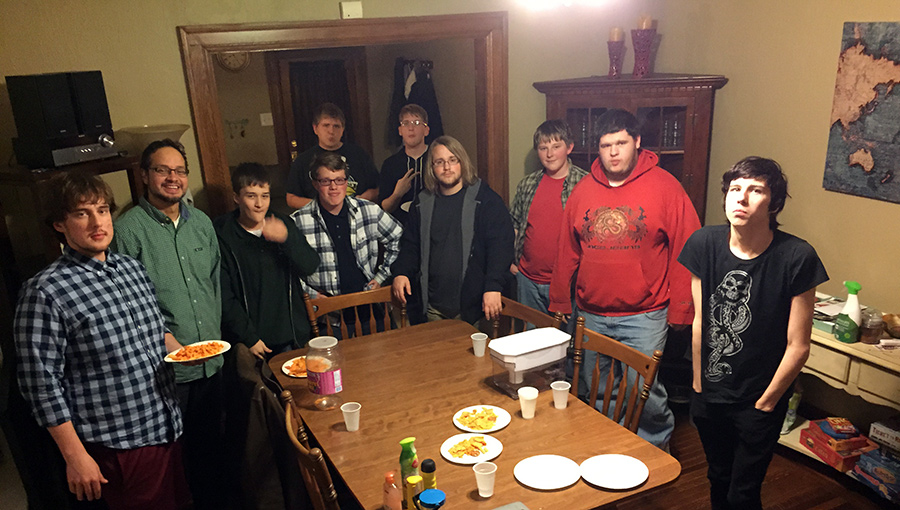A bunch of dudes come over to my house every two weeks to talk about God, games, and belief. We call it GameCell. We play games related to a topic after we answer questions and listen to each other around that topic. Lately our regular conversations have veered towards pop-cultural feuds between Bible thumpers and the LGBTQ community (which, to be honest, fits the subjects of Loving Your Enemies, The Role of Choice in Faith, and Navigating Spiritual Confusion). So I decided to make a night where we talked frankly about about LGBTQ issues and the Bible.
The most important thing about GameCell is creating a safe place for listening. And that mostly means my role is providing good questions.
~
Before we got to the real questions, I asked everybody to share their name and why they love their favorite game. New guy, Zachary, said Assassin’s Creed Brotherhood because he liked building a team. His brother Greg, the birthday boy, said Halo Reach because of how it reveals the founding backstory behind the Halo universe. Devon picked World of Tanks because he loves history and the way the game lets you feel like you’re in realistic tanks. Josh, Dan, Jeff, Seth, Alex Hively, Vince, and I also shared our our favorite games and why we like them.
“Anybody know what tonight’s about?” I asked. Dan said, “Yeah, LGBT stuff.” I confirmed, but I added that it was actually LGBTQ Night. “Who here knows what that stands for?” Dan replied again, “I know it’s Lesbian, Gay, Bi, and Trans. But I don’t know what Q is.” I explained that it was a way of including folks who identify as a part of that group while maybe not having a clear path on which letter they’re most connected to. So it’s a catch-all that’s trying to redeem a word that used to be much more hateful. I also said that even though our group might not identify as a part of this group, I wanted to create a safe place to discuss these things, how they relate to the Bible, and to really listen to one another since most conversations in our culture on the topic aren’t about listening.
We jumped into the first real question, “How do you define empathy?”
Jeff and Seth teamed-up to come up with an amazing answer: “To kinda feel what it’s like to be in somebody else’s shoes. And to try to understand what they’re going through.” This was such a good answer that we didn’t need to add anything to it.
The second question was a follow-up, “How do you grow in empathy?”
Zachary talked about how he tried to understand his gay friend and he landed at a great point when he said, “I just listened.” Some of the others shared similar stories and then Vince made a point of how important it is just to listen to people’s stories.” Devon added a point about walking alongside people and just being around them.
I changed gears, “What do you think the Bible is all about?”
Seth said, “To get people to follow a particular religion.” Alex Hively added, “To get people to do what they want and tell others that they’re wrong.” These were good honest answers, but I wanted to steer back to the authorial intent. “Let’s rephrase the question. How about, ‘What do you think the writers of the Bible intended for the Bible to convey?” I think it was Josh who said, “To get people to be decent human beings?” And his brother Dan added “To get people to focus on God, or something?”
Vince said that “It’s about the good news.” So I asked him to elaborate on what that good news was. “That Jesus died for your sins so we can have a relationship with God. That he loves us and wants to be with us.” This seemed like a good time to ask, “Do you think that’s true? That God loves everybody?” We got a lot of half-confident yeses, a handful of confident yeses, and just a couple hard “No”s.
Then I warned the next question was kinda heavy: “Why do you think the Bible calls out homosexual sex?”
A lot of our dudes said they just felt like people weren’t as accepting in Bible times. Culture was the most common answer to this one. I pointed out that most in the ancient world and Biblical cultures didn’t have a clear classification for same-sex attraction. And most of what people knew about included pagan temple prostitution of both same-sexes and opposing sexes. Plus there was weird Athenian pedophilia (pederasty). But those were very different from our day and when we talk about sexual orientation and same-sex attraction. That’s why when we came to the following verse, I asked everybody to hold this with an open hand that stays in that active tension of “maybe this is exactly what it says, or maybe it’s not?”
“Don’t you realize that those who do wrong will not inherit the Kingdom of God? Don’t fool yourselves. Those who indulge in sexual sin, or who worship idols, or commit adultery, or are male prostitutes, or practice homosexuality,” 1 Corinthians 6:9 (NLT)
I explained, this verse is just one of many used to beat-down those who identify as LGBTQ. And maybe it does say that gay sex is something that keeps people out of the Kingdom of God. But I wanted people to pick up the fact that this scripture also picks-apart any kind of sex that’s heterosexual too. More importantly, those of us who are straight and struggle with any kind of lust are also sinners too.
“Raise your hand if you’ve never lusted over somebody.” I said. Nobody raised their hand. “We’re all in the same court as far as sin goes.”
Seth asked, “So are you saying that those who call LGBT people sinners are hypocrites?” I said, “Maybe, yeah.” Then I explained that the issue of sin and sexual brokenness is something we’re all confronted with. We all struggle in this area, but God wants us to be healthy and whole.
I tried to explain that Jesus-followers who experience same-sex attraction try to reconcile this in different ways. Some feel their only way is to be celibate. Others feel like that’s too hard, so they go for a life-long commitment. And there’s a solid amount of disagreement on this issue, but that’s why the next question was so important.
“If God loves everybody, how do you think the Bible says followers of Jesus should approach LGBTQ folk?”
Everybody offered answers that pointed back to empathy and listening. “We need to become friends with people who are gay and stuff. That’s why I have lots of friends who are gay,” Alex Hively said. We all seemed to be on a similar page. So I asked, “Can you think of good stories about Christians and Queer folk?” The younger Zac talked about how he’s seen his classmates have respecting friendships despite disagreeing on the subjects of faith and orientation. I mentioned our GameCell veteran Pat Gann who wasn’t present with us because he was too busy serving and loving those in the LGBTQ youth community in Lancaster. I also gave the example of a friend Brandon Ambrosino and his pastor dad of a conservative Pentecostal church — and how his dad is very protective and supportive of him even when others in the congregation are very critical.
Then we asked the final question of the night, “How might videogames help with empathy for those different from us?”
Greg said that we can play games with people who are different from us. Seth pointed out that we can play games that let us experience other people’s struggles. “Exactly,” I said. “That’s why tonight we have a much smaller playlist to focus on the experiences of others. One of those games even lets us experience what it’s like for a transgender woman to go through hormone replacement therapy.” Our crew was pretty excited. Then we prayed together, had snack, and retreated to the basement.
Birthday boy Greg picked what we played first. His two options were Gone Home and Dys4ia. I explained that Gone Home was closer to Bioshock and Dys4ia was much shorter. His pick?
Gone Home
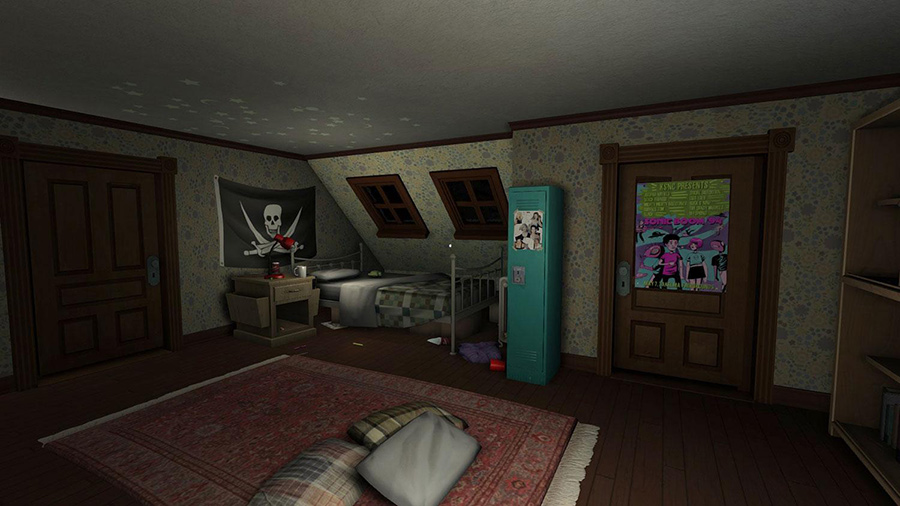
From the moment that Greg started the game, he seemed to have an idea of what to do. He went straight for the floor cabinet and then the Christmas Duck which hid the key to the house. But he didn’t know it was there. And like the rest of our crew, he didn’t know what was in the house. Everybody kept asking when the jump scares were gonna happen. Instead of a scary story, they found the pieces of the lives of believable people stuck in the challenges of 1994.
Greg drove the game with everybody in the room as his co-pilot. We explored the shelves of the VHS cassette shelf and our crew cheered when they saw The Goonies or another stack of X-files episodes. We all shut up when a special item pickup triggered one of Sam’s diary entries. We patiently read the notes that we found around the house, though I sometimes had to tell everybody what the idea was (especially when we found a three-paged story about Captain Allegra). Some things are best abbreviated when there’s an audience. I stayed out of the way as our crew came to the slow revelations about Terry or when Sam’s relationship details became extremely clear.
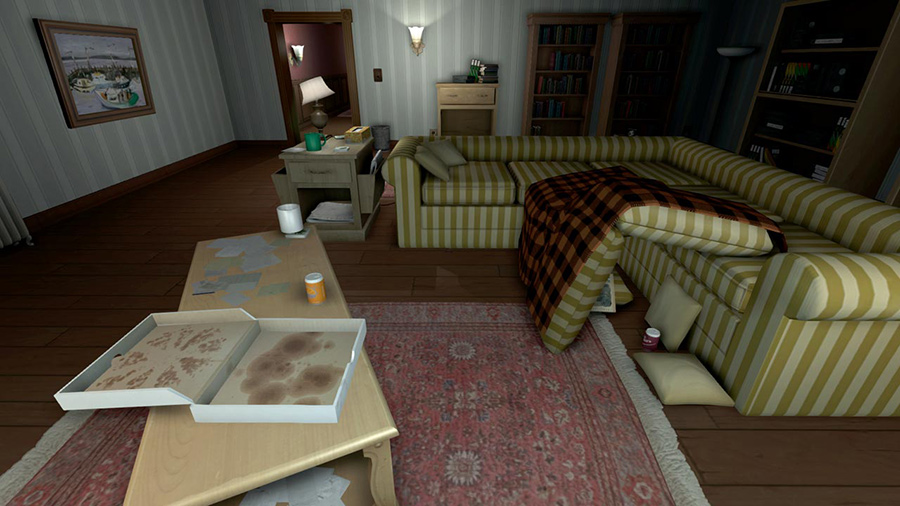
Everybody wanted to play the game for themselves when we stopped short only an hour into the game. Two guys later told me they downloaded the game as soon as they got home. Others informed me of their plans to YouTube it when they got back. But next, we shifted gears to the next game.
Dys4ia

Jeff took controls of the Keyboard and mouse as he drove the short personal game by Anna Anthropy, Dys4ia. The game uses these simple Atari-style graphics to convey the challenges of being transgender. There’s several parts where the game interactively represents the notion of not fitting and having unpleasant experiences related to feeling like she’s in the wrong place.
We sat and took in some pretty heavy thematic material of hormone replacement therapy and how unpleasant that experience was, and how much better Anna felt after her experience. It was over in just a dozen minutes or so. But it stuck with us.
Soma
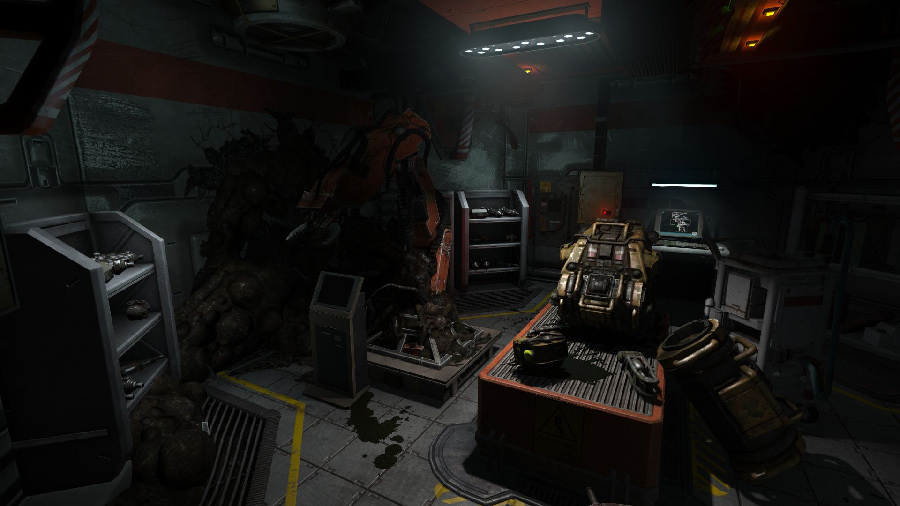
Our new guy, Zachary Burns, went straight for Soma. I was slightly concerned that we may have burnt-out on the domestic-style first person experience when we played Gone Home. But the crew seemed really into it. They even held their tongues whenever we heard somebody’s voice in the game. Everybody was into it the moment we showed up in Simon’s shoes.
We had a little trouble finding the tracer fluid in the apartment. But we teamed up and got a good bit into the underwater stations, Pathos-II before we ran out of time and had to close up GameCell shop. We never got to how Soma tied into the theme of the evening. But I really didn’t expect us to have time to get to that anyway. Nevertheless, we had a great night and we got to a lot of depth on a much-deeper subject than we would ever have time to explore in a single night.
It was a super rad night.
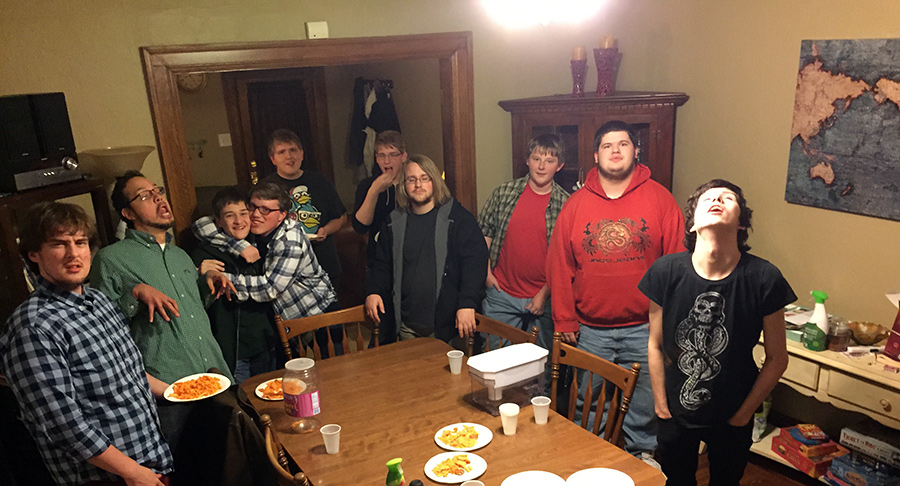
We had new guys, old guys, and a generally wonderful crew suited for deep and thoughtful conversation despite being from many different ages and perspectives. I love these guys and look forward to the next time we can get together! I absolutely loved tackling this tough stuff, but I was absolutely exhausted by the end. All I wanted to do Saturday was sleep (as evidenced by the photo my wife took).

